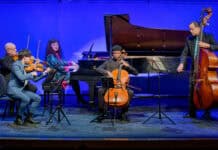The Save the Cultural Park Committee planned to submit collected signatures on a referendum petition to place the Sedona City Council’s rezoning of the Sedona Cultural Park for use as a homeless camp on the ballot for the general election to the city clerk’s office on Monday, April 8, after press time.
“This petition seeks to refer Ordinance No. 2024-01 [the “Ordinance”], as approved by the Sedona City Council on March 12, 2024, to the city’s voters for their rejection or approval,” the group’s application for a referendum states. “The ordinance approves a change to the current ‘Planned Development’ zoning of Yavapai County Assessor’s parcel 408-47-009A [located northwest of the intersection of W. State Route 89A and Cultural Park Place] by adding the city’s ‘Safe Place to Park’ program as a permitted use of the parcel through June 30, 2026.”
To place the issue on the ballot, the committee needed to obtain support from at least 10% of registered voters in Sedona during the last election, or 597 individuals, by April 11.
“We are just shy of a thousand at this point,” committee organizer Bill Noonan said of the signature count on the morning of April 8. Noonan later confirmed after the print deadline that the committee had secured a total of 1,053 signatures on the referendum petition.
The city clerk’s office will now have 20 business days to verify the signatures, after which they will be sent to Yavapai and Coconino counties for verification. The counties will then have 15 business days to determine whether any of the signatures should be disqualified on the basis of non-residency or other criteria.
Per Arizona Revised Statutes §19-124 and §19- 141, the city will mail a pamphlet containing arguments supporting and opposing the referendum to each registered voter prior to the election. Arguments supporting or opposing the referendum may be submitted to the city clerk’s office until 90 days before the election for inclusion in the pamphlet; arguments cannot exceed 300 words in length.
ARS §9-500.14 prohibits cities from using public resources to influence the outcome of an election.
The legal status of the rezoning ordinance and the implementation of the homeless camp following the filing of the referendum petition is unclear, as the committee’s organizers have stated, based on their legal advice, that the filing of the petition will automatically suspend the ordinance, while City Attorney Kurt Christianson has stated that suspension is not automatic.
“When a referendum petition is filed, council will meet to discuss its options,” Christianson said. “Rescind the rezone ordinance, wait for the election or continue knowing the project is at risk.”
Article IV, section 1.5 of the Arizona Constitution provides that “any measure to which the referendum is applied … shall become law when approved by a majority of the votes cast thereon.” Based on that constitutional language, the Supreme Court of Arizona ruled in Alabam’s Freight Co. v. Hunt in 1926 that “the express purpose of the referendum is to suspend or annul a law which has not gone into effect;” in Direct Sellers Association v. McBrayer in 1972 that a law set to go into effect after a certain period of time will automatically take effect “unless before that time has elapsed, the elctorate takes affirmative action to have it suspended and referred to the people for their vote;” and in Feldmeier v. Watson in 2005 that the referendum power “permits a minority to hold up the effective date of legislation.”
The Arizona Secretary of State’s office did not respond to a request to confirm that the ordinance will be suspended from taking effect by the successful filing of a referendum petition, instead deflecting the question to the city clerk’s office.
The Arizona Department of Housing did not respond prior to the print deadline to a request to confirm whether the city will lose the state grant funds awarded to pay for the homeless camp if the city is unable to start work on the project, due to the referendum, by July 1.
ADOH public information officer Dave Cherry stated in an email Wedesday, April 10, after our print deadline*, that “if the referendum petition you referred to acquires enough signatures to go before the voters in November, and the city of Sedona does not move forward with the proposed project until after the election in November, then in this case, per ADOH policy, we would deprogram the funding from the city of Sedona and reprogram it elsewhere. The city of Sedona would be free to re-apply for the funding once the matter is decided by the voters.”
The city of Sedona has been conducting “question-and-answer” sessions about the homeless camp over the past two weeks, which Housing Coordinator Jeanne Frieder said had been very lightly attended.
“We are very confident that after the city and county finish their verification process, we will have more than enough valid signatures to qualify for the November ballot,” Noonan said. “We are grateful to the amazing and passionate residents of Sedona who are united on this issue and signed our referendum petition. It is a remarkable achievement considering this has been a grassroots effort accomplished in just three weeks.”
*Editor’s note: The original print version of this story stated “The Arizona Department of Housing did not respond to a request …” in an email sent to the ADOH on April 3 requesting comment.
